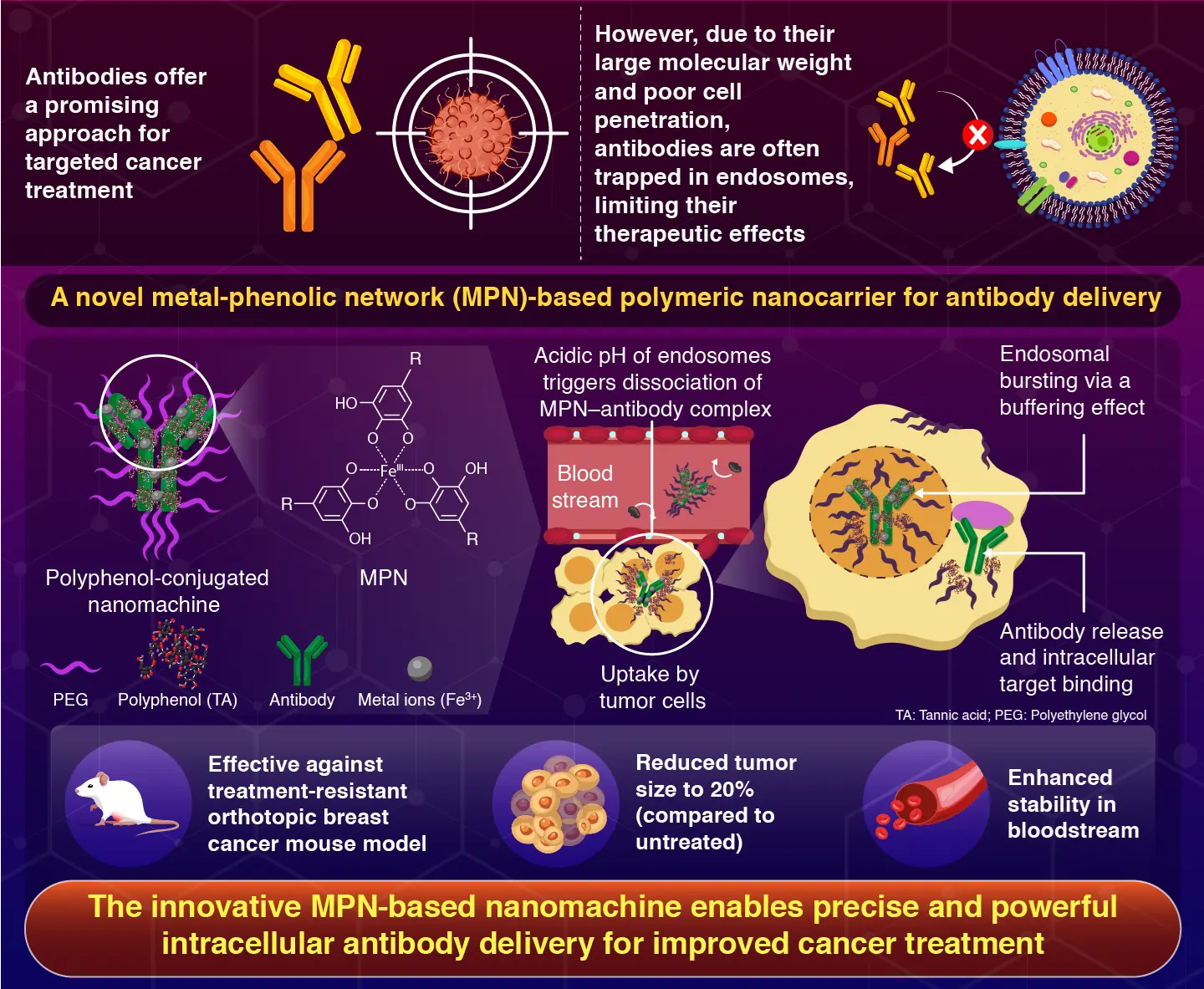Researchers in Japan have created a unique nanocarrier technology that delivers therapeutic antibodies directly to target antigens inside cancer cells, marking an important breakthrough toward better targeted cancer therapy. The findings were published in the Journal of Controlled Release on June 4th, 2025.
 Metal-phenolic network-based polymeric nanocarriers facilitating antibody cytoplasmic delivery and anti-tumor effects to orthotopic breast tumors. Image Credit: Honda et al. (2025) | Journal of Controlled Release | 10.1016/j.jconrel.2025.113929
Metal-phenolic network-based polymeric nanocarriers facilitating antibody cytoplasmic delivery and anti-tumor effects to orthotopic breast tumors. Image Credit: Honda et al. (2025) | Journal of Controlled Release | 10.1016/j.jconrel.2025.113929
Using a metal-polyphenol network, the system escapes endosomes, allowing for intracellular targeting of antibodies, resulting in tumor growth inhibition and increased anti-cancer activity, making it a viable tool for targeted cancer therapy.
Overcoming Cellular Barriers: Polyphenol-Based Nanocarriers for Antibody Delivery
The body's immune system produces Y-shaped proteins called antibodies to recognize and neutralize invading substances. By identifying distinct markers or antigens on the tumor surfaces, therapeutic antibodies—specially designed proteins made from natural antibodies—target cancer cells. By protecting healthy tissues, these proteins help the immune system combat cancers more successfully.
Although therapeutic antibodies have been shown to be effective against cancer by targeting cell surfaces, their efficacy inside cells is limited due to their inability to cross cell membranes and escape endosomal entrapment—a process in which molecules become trapped inside endosomes (membrane-bound compartments) within cells. To overcome this hurdle, researchers are now investigating several techniques for preventing antibody endosomal entrapment.
A research team from the Laboratory for Chemistry and Life Science, Institute of Science Tokyo (Science Tokyo), Japan, led by Assistant Professor Yuto Honda and Professor Nobuhiro Nishiyama, has tackled this problem by using polyphenols, a class of compounds present in wine, to create a novel nanomachine loaded with antibodies.
The Innovation Center of Nano Medicine, a division of the Kawasaki Institute of Industrial Promotion, collaborated in the development of the technology.
The study details the creation of a metal-phenolic network (MPN) polymeric nanocarrier that allows therapeutic antibodies to be precisely delivered intracellularly into cancer cells. The strategy makes use of polyphenols, which have a special mechanism for endosomal escape and antibody distribution.
We developed a nanomachine using polyphenols, polyethylene glycol (PEG), and metal ions to encapsulate the antibodies. Once inside the cells, the metal ion-polyphenolic group network triggers a buffer effect which results in the bursting of endosomes, releasing the antibodies at the target site.
Yuto Honda, Assistant Professor, Institute of Science Tokyo
The researchers began by conjugating tannic acid (TA), a polyphenol compound, with PEG to create PEG-TA, a nanocarrier system. PEG is a polymer that stabilizes the system because of its strong biocompatibility and stealth qualities.
To create an antibody-loaded MPN complex, the PEG-TA molecules were combined with the therapeutic antibody and ferric chloride (Fe3+ metal ions). Transmission electron microscopy and fluorescence correlation spectroscopy were used to examine the properties of these nanomachines, which had a diameter of 30 nm.
The administration and cellular absorption effectiveness were evaluated in vitro, and anti-tumor activity was proven in vivo in an orthotopic mouse model of treatment-resistant breast cancer. The results demonstrated that the nanomachines were very stable in the circulation, with increased absorption by tumor cells, lowering tumor growth by 20% compared to the untreated control group. The significant anti-tumor efficacy was linked to the novel mode of antibody release.
When the nanomachines are absorbed by the tumor cells, they become entrapped inside endosomes. The MPNs separate from antibodies due to the endosomes' internal acidic pH, and the MPNs that are released produce a buffering effect that encourages the entry of protons and counterions from the outside of the endosome.
This damages the endosome membrane and raises the internal osmotic pressure. The dissociated antibodies are released when the endosomes burst and can subsequently bind to the antigen targets inside the cell.
The study revealed the effective delivery of an anti-S100A4 antibody, which restored the function of the tumor suppressor protein p53, resulting in tumor cell death. Furthermore, the effects were identified with low toxicity.
Honda concluded, “Our study marks a significant step toward developing next-generation intracellular antibody therapies. The non-cationic, biocompatible, and systemically injectable design of our MPN system could expand its applications beyond cancer, paving the way for next-generation drug targeting.”
Journal Reference:
Honda, Y., et al. (2025) Metal-phenolic network-based polymeric nanocarriers facilitating antibody cytoplasmic delivery and anti-tumor effects to orthotopic breast tumors. Journal of Controlled Release. doi.org/10.1016/j.jconrel.2025.113929.